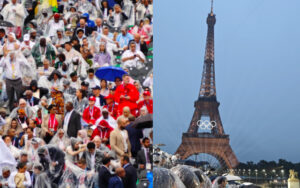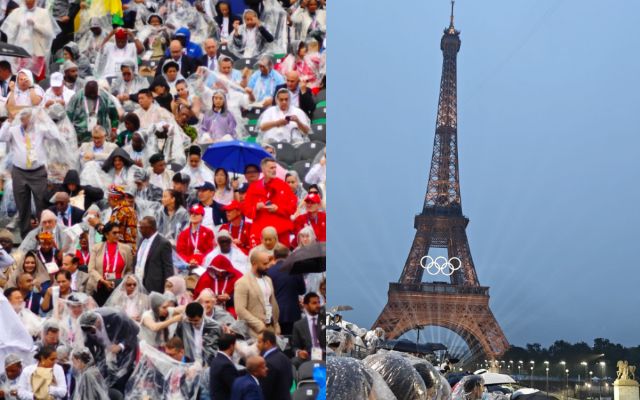
Boria Majumdar in Paris
The Olympic Games opening ceremony is supposed to be a melting pot of the world. And this time round, with it being out in the open on the river Seine opposite the Eiffel Tower, it was all the more so. As many as 206 national Olympic committees and 1 refugee team showcased all that is good about our world in front of 320,000 people. The build-up was about 100 boats carrying 6800 athletes down the river. About Celine Dion performing. Or so one thought. On the day itself, it all changed. From the morning of July 26, Paris was all about security threats, train lines vandalised, cops and military everywhere and the conversion of the city into something of a war zone.
A trip from our hotel to the Main Press Centre, from where you get buses to every competition venue, takes about 40 minutes. On Friday morning, it took close to two hours. Every third station, the metro was being stopped with cops getting on to conduct checks. Randomly, passengers were asked to show an ID, and even the media weren’t spared. Interestingly, accreditations weren’t deemed enough, and we were asked to show our passports before we could travel.
In fact, at one of the stations, a cop pushed open the train door as it was sliding shut and forced his way in. Thereafter, he went to another compartment and pushed a man and a woman out of the train. While we didn’t really know what was going on, the truth is it was scary. There were hardly any volunteers who spoke English and who could explain what was going on. The police hardly speak English, and were getting impatient if a second question was asked.
While we were halfway, police jumped on the train and started shouting “Termination”. Midway, the train was stopped, and we did not really know what to do. Finally, when we figured out our route after a few more checks, we were told that every station in and around the Eiffel Tower was closed for the day.
For the Latest Sports News: Click Here
The media were actually asked to reach by 3:30pm, at least four hours in advance, and take their seats. Checks and body frisks meant the queue was humungous. Two of our colleagues, Trisha Ghosal and Abhijit Deshmukh, reported saying the line hardly moved and the checks were at times excessive. Clearly, the cops did not want to take a chance with world’s gaze on Paris.
I have covered four Olympic Games in the past, and never before have I seen anything like this. Even London had a security threat, but not once did the city seem a war zone. There weren’t cops everywhere and never did the media have to carry a state ID to prove their identity all the time. Rio was absolutely peaceful despite all the threats of muggings, and Tokyo, despite Covid-19, was calmness itself.
Paris is a reflection of the geo-political reality we live in. With the Israel-Palestine conflict and Russia waging war in Ukraine all in the background, none of this was unexpected. And with Russia banned by the International Olympic Committee (IOC), more so. Because of the security overdose, the real charm of the opening ceremony was lost on many. For us, it was more about when it would get done so that we could get back to the safety of our hotels.
Whatever it was, it wasn’t a global symbol of peace and harmony. Rather, it was very much indicative of a divided world, a world infested by threats and fear. One can only hope that the Games will get better, and we will have two weeks of extraordinary sport rather than continued headlines about security.
Also Read: Rice-mango pickle and why comfort foods matter for athletes: PT Usha opens up on then and now





